Discussion of Justice: Ethical Dilemmas in Sweatshop Labor Practices
VerifiedAdded on 2023/01/10
|7
|1630
|36
Essay
AI Summary
This essay delves into the complex ethical issues surrounding sweatshops, focusing on the concept of justice in the context of labor practices. It examines the allegations of exploitation, particularly concerning wages and working conditions, and explores the perspectives of various authors such as Zwolinski, Malmqvist, and Kim & Werbach. The discussion covers the role of multinational enterprises (MNEs), worker autonomy, and the ethical implications of accepting low wages versus the absence of employment. The essay analyzes arguments about worker self-determination, moral dilemmas, and the responsibilities of businesses to their employees. It also investigates the impact of managerial actions and the potential for intervention by governments and consumer groups. The conclusion touches upon the challenges of achieving justice in sweatshop environments and the need for ethical considerations.
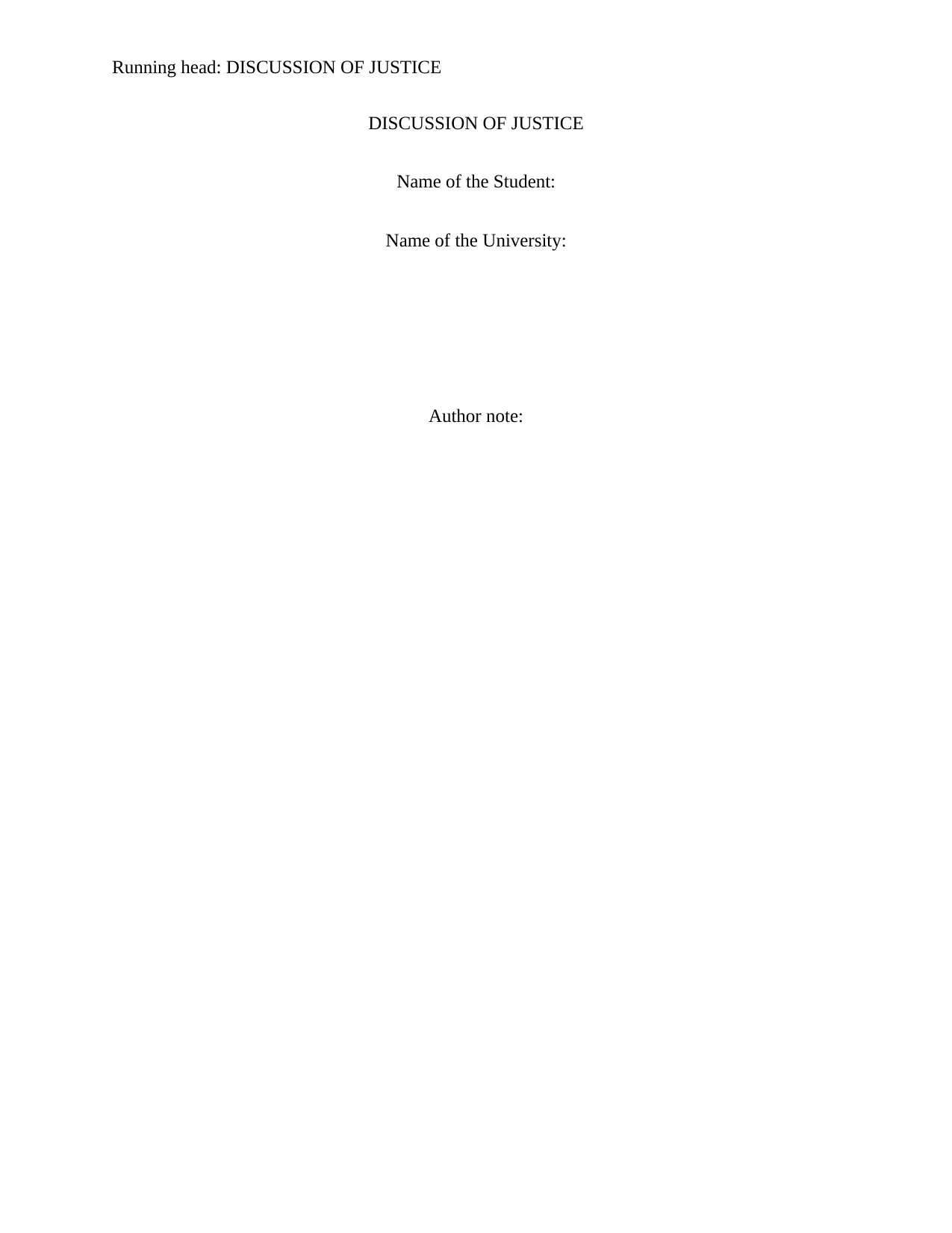
Running head: DISCUSSION OF JUSTICE
DISCUSSION OF JUSTICE
Name of the Student:
Name of the University:
Author note:
DISCUSSION OF JUSTICE
Name of the Student:
Name of the University:
Author note:
Paraphrase This Document
Need a fresh take? Get an instant paraphrase of this document with our AI Paraphraser
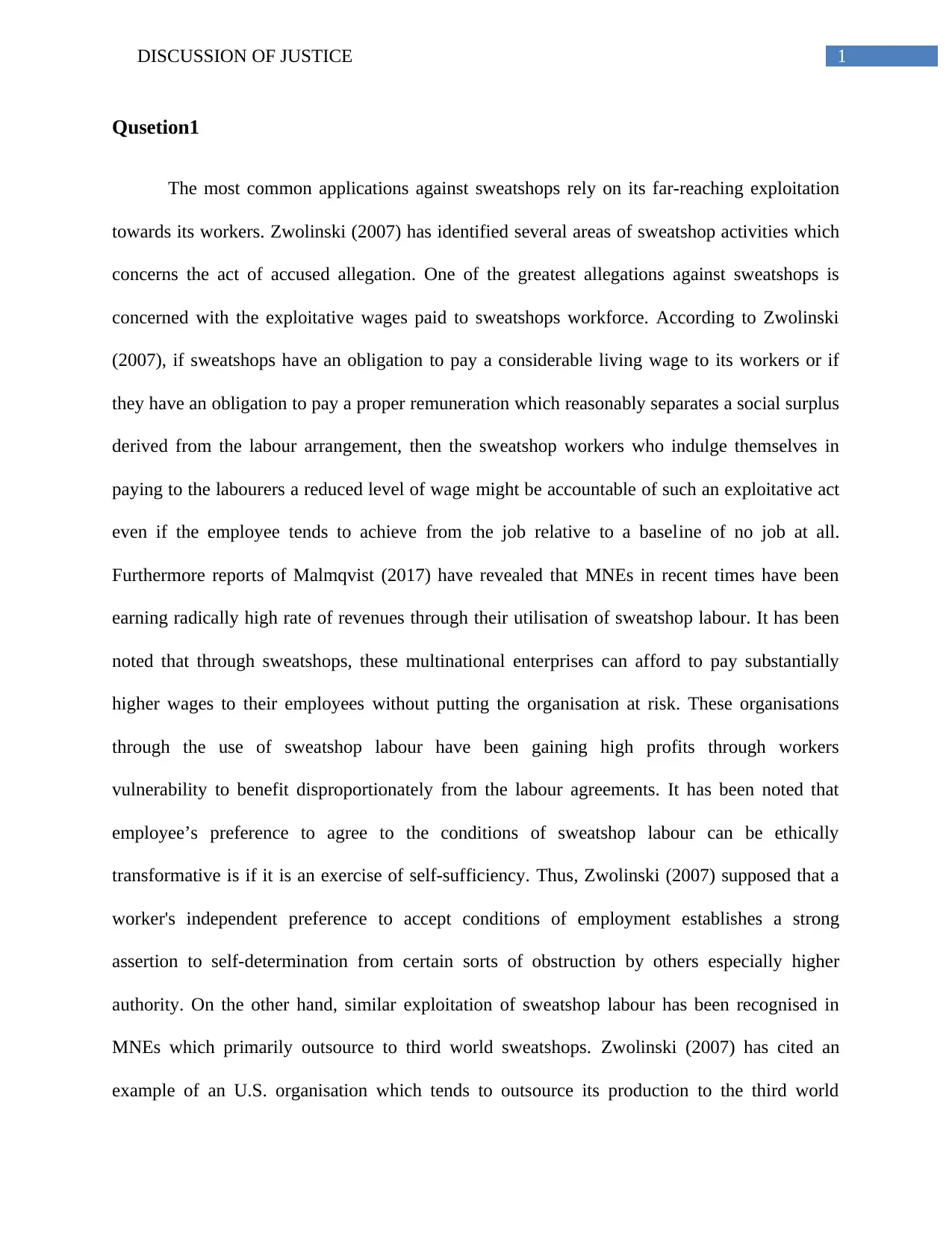
1DISCUSSION OF JUSTICE
Qusetion1
The most common applications against sweatshops rely on its far-reaching exploitation
towards its workers. Zwolinski (2007) has identified several areas of sweatshop activities which
concerns the act of accused allegation. One of the greatest allegations against sweatshops is
concerned with the exploitative wages paid to sweatshops workforce. According to Zwolinski
(2007), if sweatshops have an obligation to pay a considerable living wage to its workers or if
they have an obligation to pay a proper remuneration which reasonably separates a social surplus
derived from the labour arrangement, then the sweatshop workers who indulge themselves in
paying to the labourers a reduced level of wage might be accountable of such an exploitative act
even if the employee tends to achieve from the job relative to a baseline of no job at all.
Furthermore reports of Malmqvist (2017) have revealed that MNEs in recent times have been
earning radically high rate of revenues through their utilisation of sweatshop labour. It has been
noted that through sweatshops, these multinational enterprises can afford to pay substantially
higher wages to their employees without putting the organisation at risk. These organisations
through the use of sweatshop labour have been gaining high profits through workers
vulnerability to benefit disproportionately from the labour agreements. It has been noted that
employee’s preference to agree to the conditions of sweatshop labour can be ethically
transformative is if it is an exercise of self-sufficiency. Thus, Zwolinski (2007) supposed that a
worker's independent preference to accept conditions of employment establishes a strong
assertion to self-determination from certain sorts of obstruction by others especially higher
authority. On the other hand, similar exploitation of sweatshop labour has been recognised in
MNEs which primarily outsource to third world sweatshops. Zwolinski (2007) has cited an
example of an U.S. organisation which tends to outsource its production to the third world
Qusetion1
The most common applications against sweatshops rely on its far-reaching exploitation
towards its workers. Zwolinski (2007) has identified several areas of sweatshop activities which
concerns the act of accused allegation. One of the greatest allegations against sweatshops is
concerned with the exploitative wages paid to sweatshops workforce. According to Zwolinski
(2007), if sweatshops have an obligation to pay a considerable living wage to its workers or if
they have an obligation to pay a proper remuneration which reasonably separates a social surplus
derived from the labour arrangement, then the sweatshop workers who indulge themselves in
paying to the labourers a reduced level of wage might be accountable of such an exploitative act
even if the employee tends to achieve from the job relative to a baseline of no job at all.
Furthermore reports of Malmqvist (2017) have revealed that MNEs in recent times have been
earning radically high rate of revenues through their utilisation of sweatshop labour. It has been
noted that through sweatshops, these multinational enterprises can afford to pay substantially
higher wages to their employees without putting the organisation at risk. These organisations
through the use of sweatshop labour have been gaining high profits through workers
vulnerability to benefit disproportionately from the labour agreements. It has been noted that
employee’s preference to agree to the conditions of sweatshop labour can be ethically
transformative is if it is an exercise of self-sufficiency. Thus, Zwolinski (2007) supposed that a
worker's independent preference to accept conditions of employment establishes a strong
assertion to self-determination from certain sorts of obstruction by others especially higher
authority. On the other hand, similar exploitation of sweatshop labour has been recognised in
MNEs which primarily outsource to third world sweatshops. Zwolinski (2007) has cited an
example of an U.S. organisation which tends to outsource its production to the third world
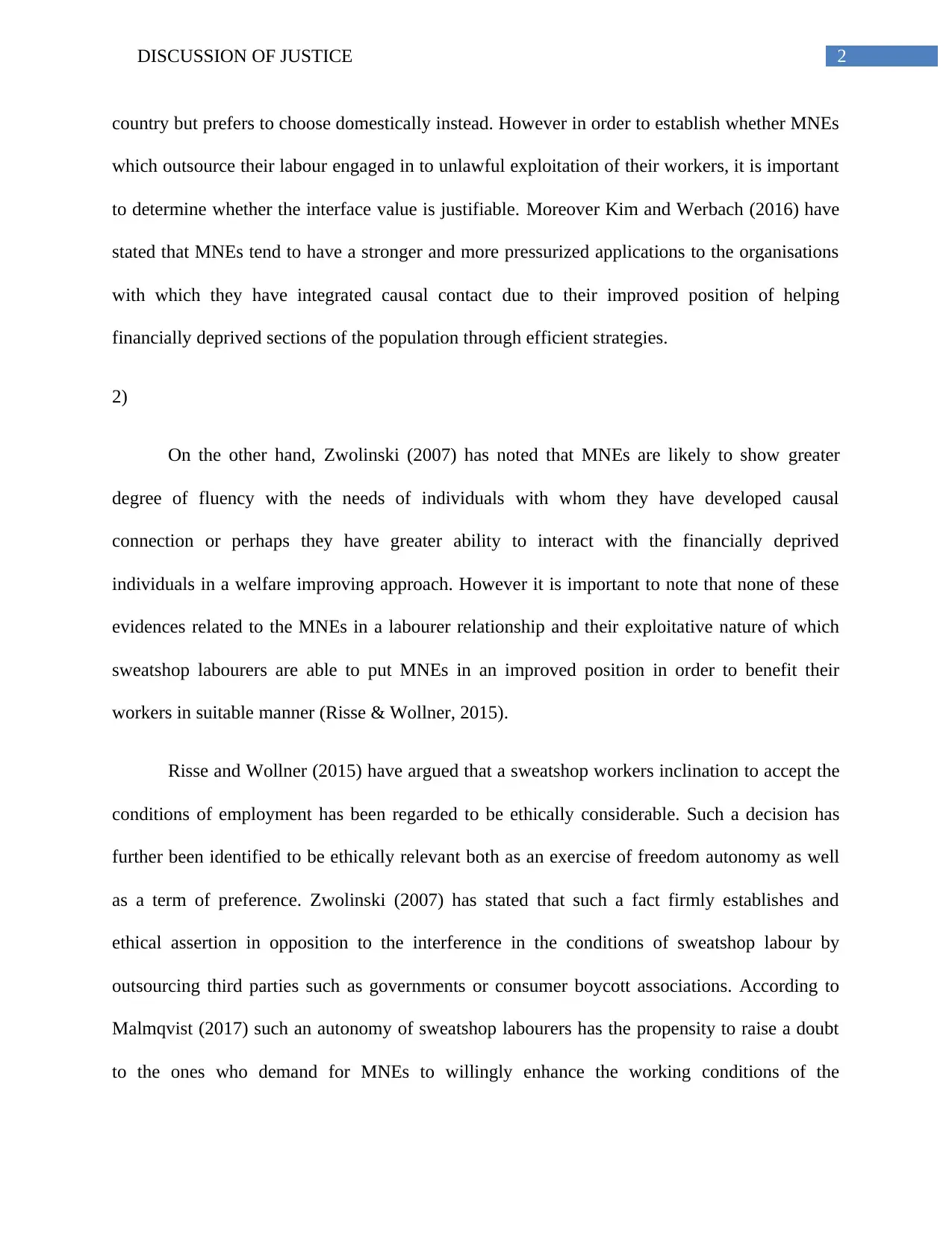
2DISCUSSION OF JUSTICE
country but prefers to choose domestically instead. However in order to establish whether MNEs
which outsource their labour engaged in to unlawful exploitation of their workers, it is important
to determine whether the interface value is justifiable. Moreover Kim and Werbach (2016) have
stated that MNEs tend to have a stronger and more pressurized applications to the organisations
with which they have integrated causal contact due to their improved position of helping
financially deprived sections of the population through efficient strategies.
2)
On the other hand, Zwolinski (2007) has noted that MNEs are likely to show greater
degree of fluency with the needs of individuals with whom they have developed causal
connection or perhaps they have greater ability to interact with the financially deprived
individuals in a welfare improving approach. However it is important to note that none of these
evidences related to the MNEs in a labourer relationship and their exploitative nature of which
sweatshop labourers are able to put MNEs in an improved position in order to benefit their
workers in suitable manner (Risse & Wollner, 2015).
Risse and Wollner (2015) have argued that a sweatshop workers inclination to accept the
conditions of employment has been regarded to be ethically considerable. Such a decision has
further been identified to be ethically relevant both as an exercise of freedom autonomy as well
as a term of preference. Zwolinski (2007) has stated that such a fact firmly establishes and
ethical assertion in opposition to the interference in the conditions of sweatshop labour by
outsourcing third parties such as governments or consumer boycott associations. According to
Malmqvist (2017) such an autonomy of sweatshop labourers has the propensity to raise a doubt
to the ones who demand for MNEs to willingly enhance the working conditions of the
country but prefers to choose domestically instead. However in order to establish whether MNEs
which outsource their labour engaged in to unlawful exploitation of their workers, it is important
to determine whether the interface value is justifiable. Moreover Kim and Werbach (2016) have
stated that MNEs tend to have a stronger and more pressurized applications to the organisations
with which they have integrated causal contact due to their improved position of helping
financially deprived sections of the population through efficient strategies.
2)
On the other hand, Zwolinski (2007) has noted that MNEs are likely to show greater
degree of fluency with the needs of individuals with whom they have developed causal
connection or perhaps they have greater ability to interact with the financially deprived
individuals in a welfare improving approach. However it is important to note that none of these
evidences related to the MNEs in a labourer relationship and their exploitative nature of which
sweatshop labourers are able to put MNEs in an improved position in order to benefit their
workers in suitable manner (Risse & Wollner, 2015).
Risse and Wollner (2015) have argued that a sweatshop workers inclination to accept the
conditions of employment has been regarded to be ethically considerable. Such a decision has
further been identified to be ethically relevant both as an exercise of freedom autonomy as well
as a term of preference. Zwolinski (2007) has stated that such a fact firmly establishes and
ethical assertion in opposition to the interference in the conditions of sweatshop labour by
outsourcing third parties such as governments or consumer boycott associations. According to
Malmqvist (2017) such an autonomy of sweatshop labourers has the propensity to raise a doubt
to the ones who demand for MNEs to willingly enhance the working conditions of the
⊘ This is a preview!⊘
Do you want full access?
Subscribe today to unlock all pages.

Trusted by 1+ million students worldwide
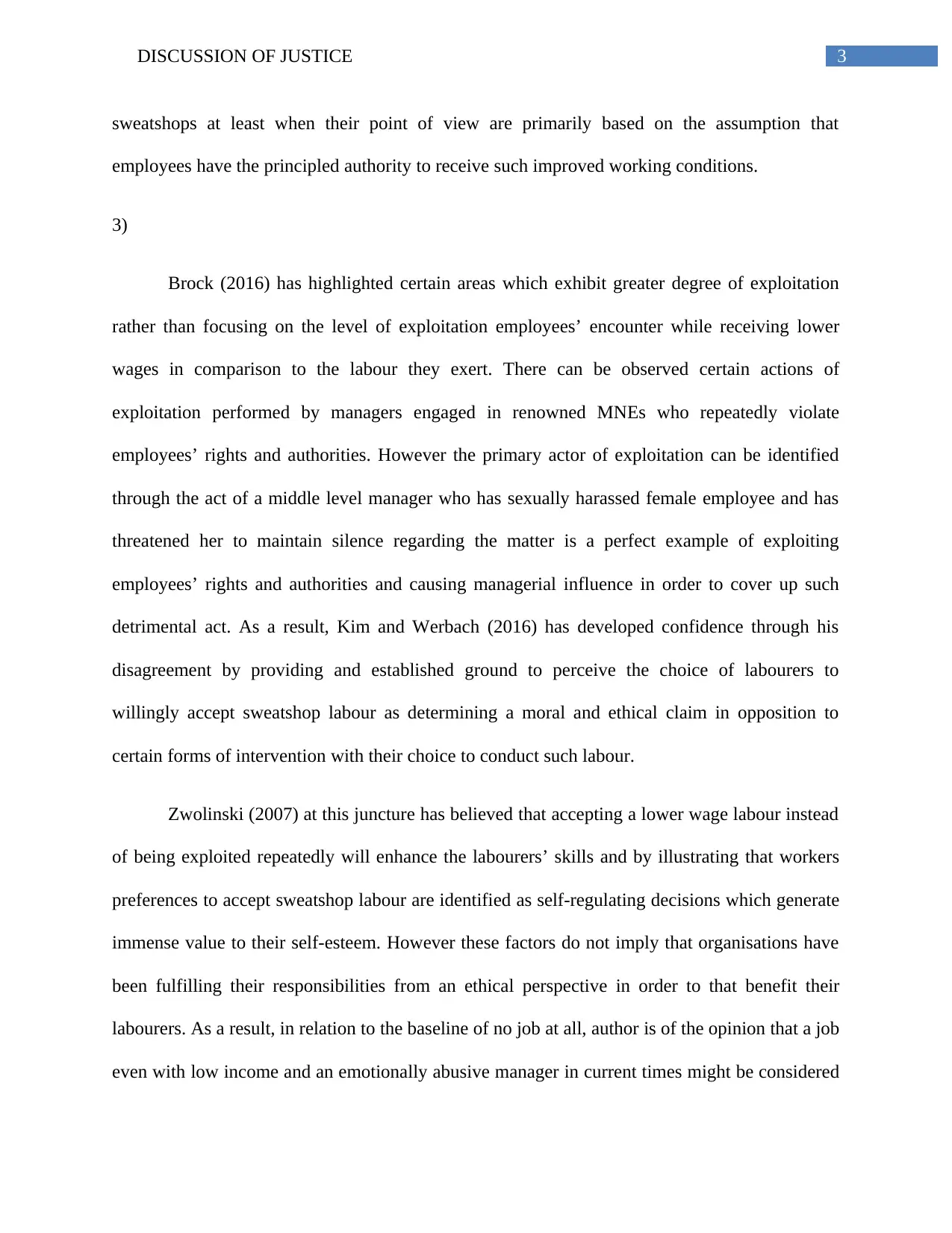
3DISCUSSION OF JUSTICE
sweatshops at least when their point of view are primarily based on the assumption that
employees have the principled authority to receive such improved working conditions.
3)
Brock (2016) has highlighted certain areas which exhibit greater degree of exploitation
rather than focusing on the level of exploitation employees’ encounter while receiving lower
wages in comparison to the labour they exert. There can be observed certain actions of
exploitation performed by managers engaged in renowned MNEs who repeatedly violate
employees’ rights and authorities. However the primary actor of exploitation can be identified
through the act of a middle level manager who has sexually harassed female employee and has
threatened her to maintain silence regarding the matter is a perfect example of exploiting
employees’ rights and authorities and causing managerial influence in order to cover up such
detrimental act. As a result, Kim and Werbach (2016) has developed confidence through his
disagreement by providing and established ground to perceive the choice of labourers to
willingly accept sweatshop labour as determining a moral and ethical claim in opposition to
certain forms of intervention with their choice to conduct such labour.
Zwolinski (2007) at this juncture has believed that accepting a lower wage labour instead
of being exploited repeatedly will enhance the labourers’ skills and by illustrating that workers
preferences to accept sweatshop labour are identified as self-regulating decisions which generate
immense value to their self-esteem. However these factors do not imply that organisations have
been fulfilling their responsibilities from an ethical perspective in order to that benefit their
labourers. As a result, in relation to the baseline of no job at all, author is of the opinion that a job
even with low income and an emotionally abusive manager in current times might be considered
sweatshops at least when their point of view are primarily based on the assumption that
employees have the principled authority to receive such improved working conditions.
3)
Brock (2016) has highlighted certain areas which exhibit greater degree of exploitation
rather than focusing on the level of exploitation employees’ encounter while receiving lower
wages in comparison to the labour they exert. There can be observed certain actions of
exploitation performed by managers engaged in renowned MNEs who repeatedly violate
employees’ rights and authorities. However the primary actor of exploitation can be identified
through the act of a middle level manager who has sexually harassed female employee and has
threatened her to maintain silence regarding the matter is a perfect example of exploiting
employees’ rights and authorities and causing managerial influence in order to cover up such
detrimental act. As a result, Kim and Werbach (2016) has developed confidence through his
disagreement by providing and established ground to perceive the choice of labourers to
willingly accept sweatshop labour as determining a moral and ethical claim in opposition to
certain forms of intervention with their choice to conduct such labour.
Zwolinski (2007) at this juncture has believed that accepting a lower wage labour instead
of being exploited repeatedly will enhance the labourers’ skills and by illustrating that workers
preferences to accept sweatshop labour are identified as self-regulating decisions which generate
immense value to their self-esteem. However these factors do not imply that organisations have
been fulfilling their responsibilities from an ethical perspective in order to that benefit their
labourers. As a result, in relation to the baseline of no job at all, author is of the opinion that a job
even with low income and an emotionally abusive manager in current times might be considered
Paraphrase This Document
Need a fresh take? Get an instant paraphrase of this document with our AI Paraphraser
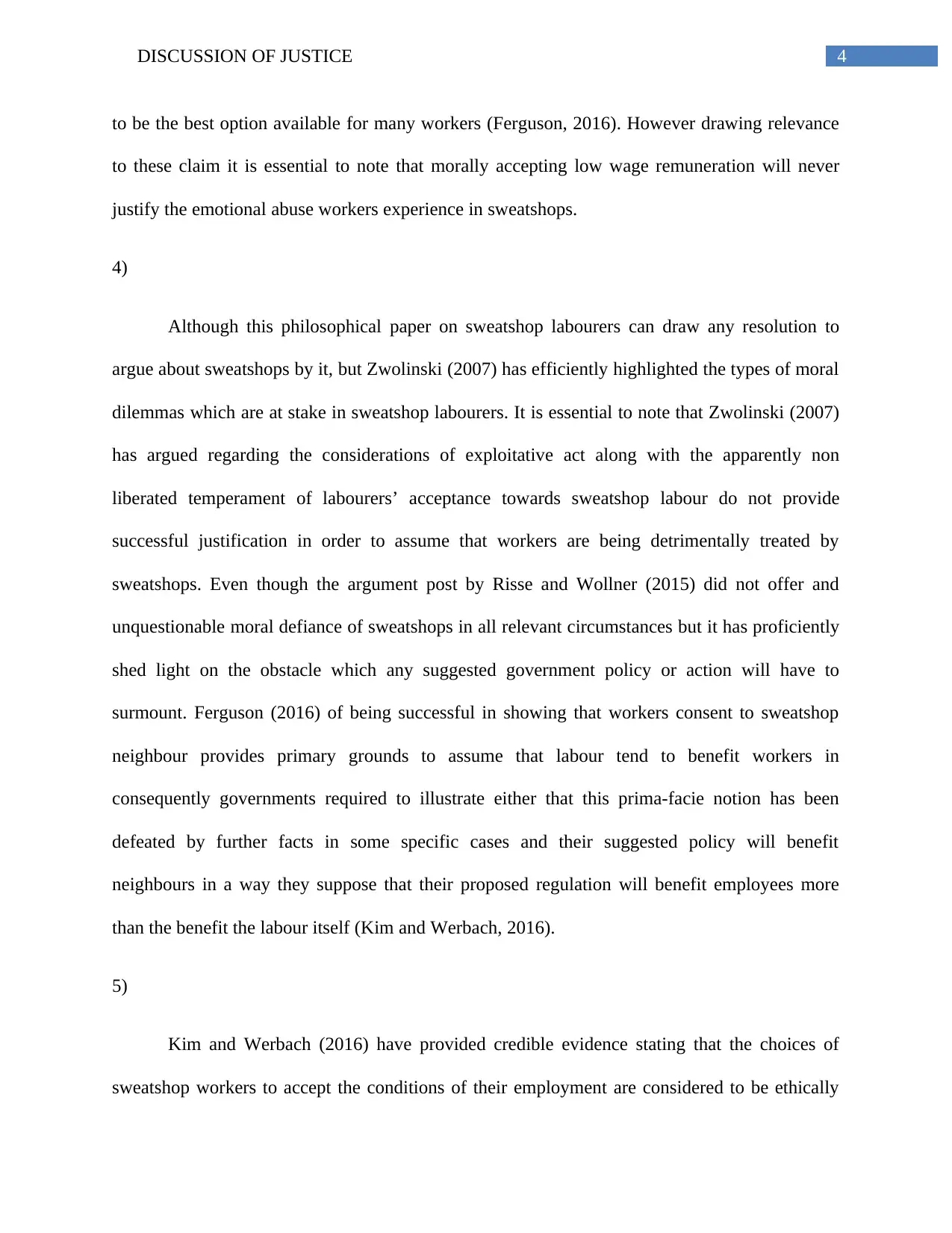
4DISCUSSION OF JUSTICE
to be the best option available for many workers (Ferguson, 2016). However drawing relevance
to these claim it is essential to note that morally accepting low wage remuneration will never
justify the emotional abuse workers experience in sweatshops.
4)
Although this philosophical paper on sweatshop labourers can draw any resolution to
argue about sweatshops by it, but Zwolinski (2007) has efficiently highlighted the types of moral
dilemmas which are at stake in sweatshop labourers. It is essential to note that Zwolinski (2007)
has argued regarding the considerations of exploitative act along with the apparently non
liberated temperament of labourers’ acceptance towards sweatshop labour do not provide
successful justification in order to assume that workers are being detrimentally treated by
sweatshops. Even though the argument post by Risse and Wollner (2015) did not offer and
unquestionable moral defiance of sweatshops in all relevant circumstances but it has proficiently
shed light on the obstacle which any suggested government policy or action will have to
surmount. Ferguson (2016) of being successful in showing that workers consent to sweatshop
neighbour provides primary grounds to assume that labour tend to benefit workers in
consequently governments required to illustrate either that this prima-facie notion has been
defeated by further facts in some specific cases and their suggested policy will benefit
neighbours in a way they suppose that their proposed regulation will benefit employees more
than the benefit the labour itself (Kim and Werbach, 2016).
5)
Kim and Werbach (2016) have provided credible evidence stating that the choices of
sweatshop workers to accept the conditions of their employment are considered to be ethically
to be the best option available for many workers (Ferguson, 2016). However drawing relevance
to these claim it is essential to note that morally accepting low wage remuneration will never
justify the emotional abuse workers experience in sweatshops.
4)
Although this philosophical paper on sweatshop labourers can draw any resolution to
argue about sweatshops by it, but Zwolinski (2007) has efficiently highlighted the types of moral
dilemmas which are at stake in sweatshop labourers. It is essential to note that Zwolinski (2007)
has argued regarding the considerations of exploitative act along with the apparently non
liberated temperament of labourers’ acceptance towards sweatshop labour do not provide
successful justification in order to assume that workers are being detrimentally treated by
sweatshops. Even though the argument post by Risse and Wollner (2015) did not offer and
unquestionable moral defiance of sweatshops in all relevant circumstances but it has proficiently
shed light on the obstacle which any suggested government policy or action will have to
surmount. Ferguson (2016) of being successful in showing that workers consent to sweatshop
neighbour provides primary grounds to assume that labour tend to benefit workers in
consequently governments required to illustrate either that this prima-facie notion has been
defeated by further facts in some specific cases and their suggested policy will benefit
neighbours in a way they suppose that their proposed regulation will benefit employees more
than the benefit the labour itself (Kim and Werbach, 2016).
5)
Kim and Werbach (2016) have provided credible evidence stating that the choices of
sweatshop workers to accept the conditions of their employment are considered to be ethically
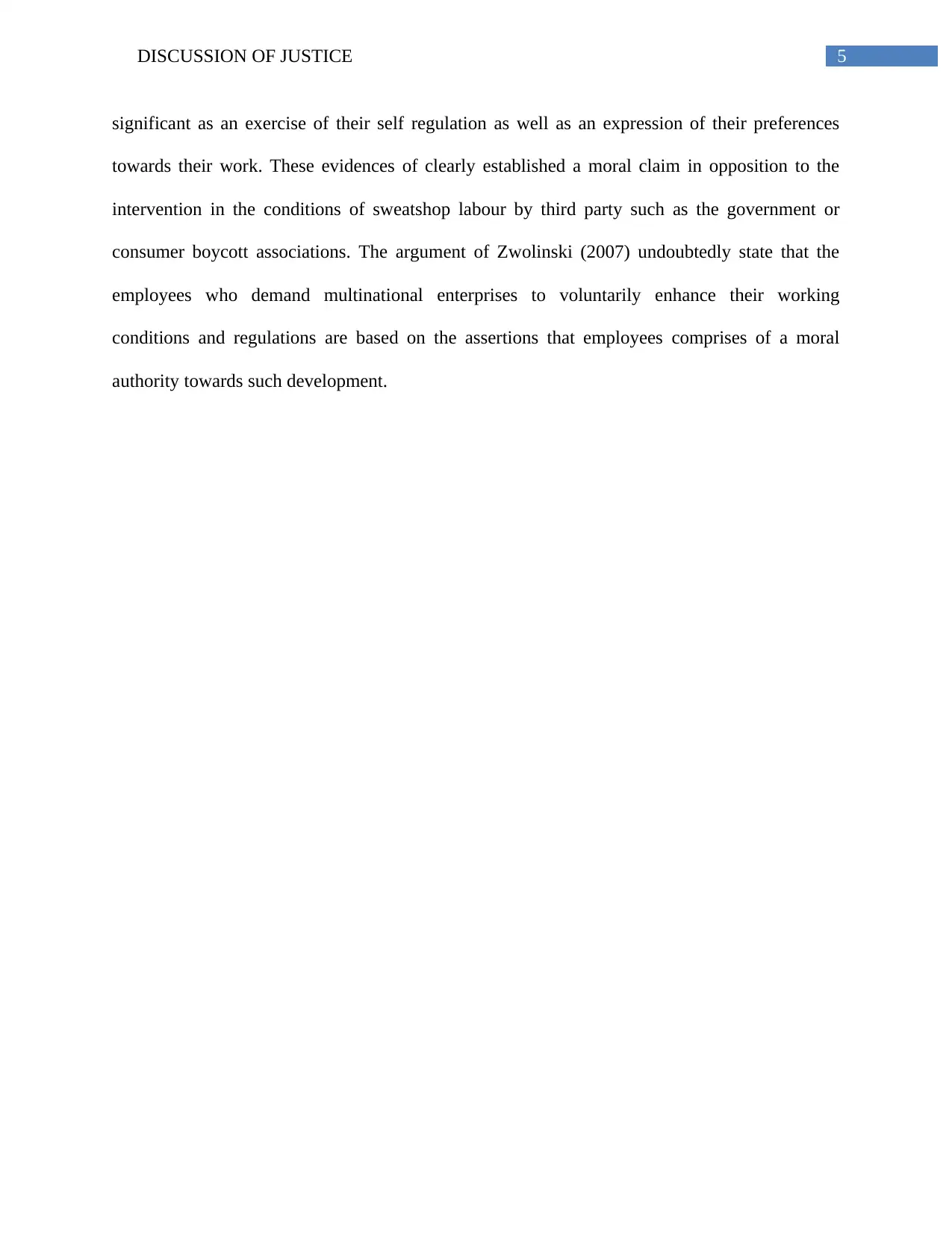
5DISCUSSION OF JUSTICE
significant as an exercise of their self regulation as well as an expression of their preferences
towards their work. These evidences of clearly established a moral claim in opposition to the
intervention in the conditions of sweatshop labour by third party such as the government or
consumer boycott associations. The argument of Zwolinski (2007) undoubtedly state that the
employees who demand multinational enterprises to voluntarily enhance their working
conditions and regulations are based on the assertions that employees comprises of a moral
authority towards such development.
significant as an exercise of their self regulation as well as an expression of their preferences
towards their work. These evidences of clearly established a moral claim in opposition to the
intervention in the conditions of sweatshop labour by third party such as the government or
consumer boycott associations. The argument of Zwolinski (2007) undoubtedly state that the
employees who demand multinational enterprises to voluntarily enhance their working
conditions and regulations are based on the assertions that employees comprises of a moral
authority towards such development.
⊘ This is a preview!⊘
Do you want full access?
Subscribe today to unlock all pages.

Trusted by 1+ million students worldwide
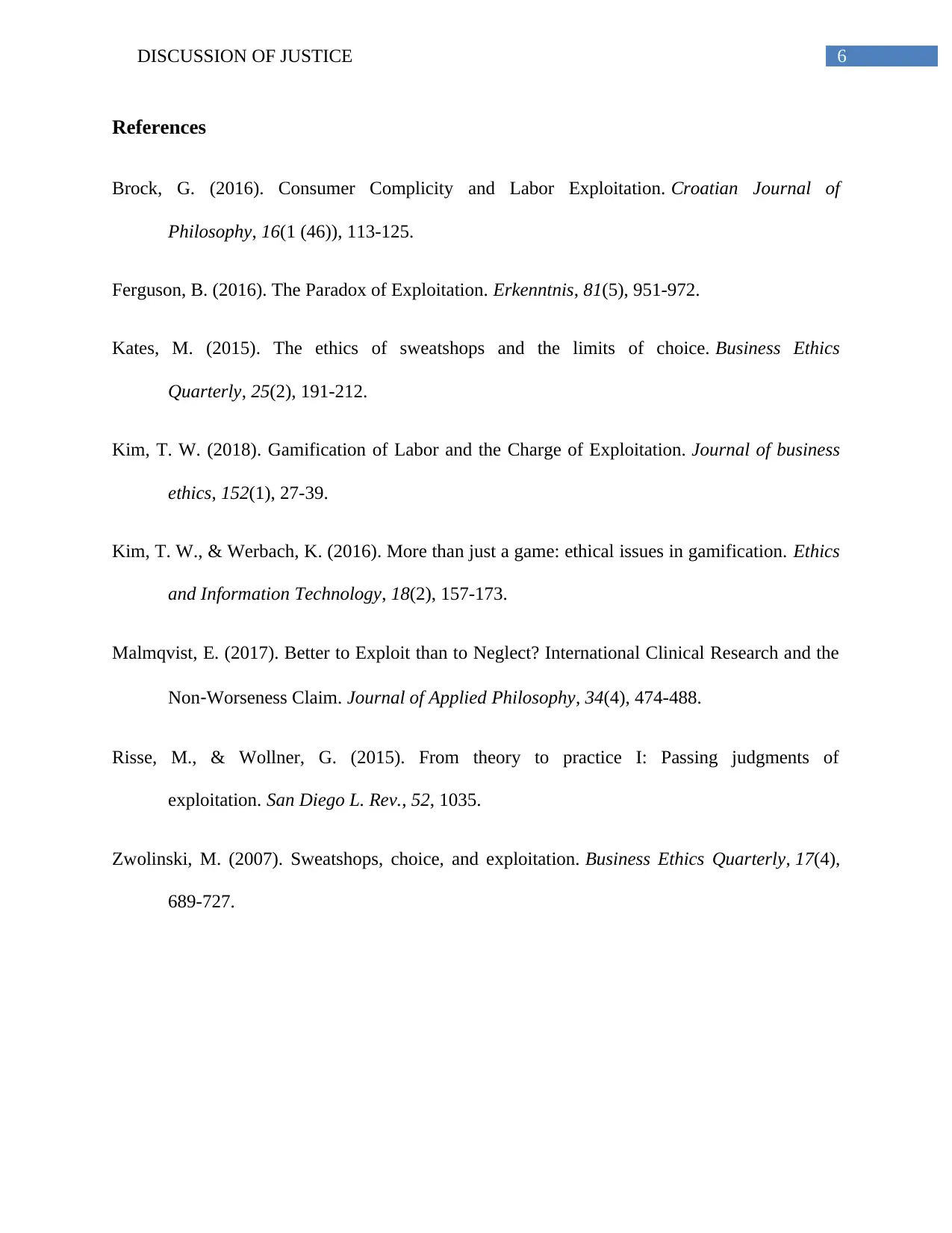
6DISCUSSION OF JUSTICE
References
Brock, G. (2016). Consumer Complicity and Labor Exploitation. Croatian Journal of
Philosophy, 16(1 (46)), 113-125.
Ferguson, B. (2016). The Paradox of Exploitation. Erkenntnis, 81(5), 951-972.
Kates, M. (2015). The ethics of sweatshops and the limits of choice. Business Ethics
Quarterly, 25(2), 191-212.
Kim, T. W. (2018). Gamification of Labor and the Charge of Exploitation. Journal of business
ethics, 152(1), 27-39.
Kim, T. W., & Werbach, K. (2016). More than just a game: ethical issues in gamification. Ethics
and Information Technology, 18(2), 157-173.
Malmqvist, E. (2017). Better to Exploit than to Neglect? International Clinical Research and the
Non‐Worseness Claim. Journal of Applied Philosophy, 34(4), 474-488.
Risse, M., & Wollner, G. (2015). From theory to practice I: Passing judgments of
exploitation. San Diego L. Rev., 52, 1035.
Zwolinski, M. (2007). Sweatshops, choice, and exploitation. Business Ethics Quarterly, 17(4),
689-727.
References
Brock, G. (2016). Consumer Complicity and Labor Exploitation. Croatian Journal of
Philosophy, 16(1 (46)), 113-125.
Ferguson, B. (2016). The Paradox of Exploitation. Erkenntnis, 81(5), 951-972.
Kates, M. (2015). The ethics of sweatshops and the limits of choice. Business Ethics
Quarterly, 25(2), 191-212.
Kim, T. W. (2018). Gamification of Labor and the Charge of Exploitation. Journal of business
ethics, 152(1), 27-39.
Kim, T. W., & Werbach, K. (2016). More than just a game: ethical issues in gamification. Ethics
and Information Technology, 18(2), 157-173.
Malmqvist, E. (2017). Better to Exploit than to Neglect? International Clinical Research and the
Non‐Worseness Claim. Journal of Applied Philosophy, 34(4), 474-488.
Risse, M., & Wollner, G. (2015). From theory to practice I: Passing judgments of
exploitation. San Diego L. Rev., 52, 1035.
Zwolinski, M. (2007). Sweatshops, choice, and exploitation. Business Ethics Quarterly, 17(4),
689-727.
1 out of 7
Related Documents
Your All-in-One AI-Powered Toolkit for Academic Success.
+13062052269
info@desklib.com
Available 24*7 on WhatsApp / Email
![[object Object]](/_next/static/media/star-bottom.7253800d.svg)
Unlock your academic potential
Copyright © 2020–2026 A2Z Services. All Rights Reserved. Developed and managed by ZUCOL.





